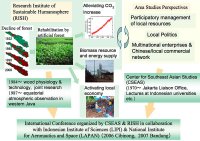Details
This research initiative aims towards an integration of the natural sciences with the social and human sciences on a practical level, through a joint project in the same fieldsite, upon the solid foundation of past research experiences of the Research Institute of Sustainable Humanosphere (RISH) and the Center for Southeast Asian Studies. Industrial forest plantation (HTI) has an important role in Indonesia, where forest destruction has been especially rampant in recent years. Palm oil plantation, and acacia forest are examples of such plantations. However, the latter has often been the cause of conflict with neighboring inhabitants, and it has been suggested that they have negative impact on forest conservation. In the face of this, we need to consider the construction of a sustainable forest sphere in the truest sense.
In this research initiative, we have chosen as our common field site, the large scale plantation of acacia mangium in Palemban, Sumatra as an example of such industrial plantation. So far, RISH has accumulated research towards sustainable management of acacia forests such as the high-level use of acacia timber, use of its discharge, improvement of the seedling variety, etc.
From the side of area studies, we aim to design a sustainable forest sphere around the key word of "diversification". We can make positive use of the multi-layered structure of the forest, diversity from the subjects of the management, and the diversity and occupationally multiple situation within the management unit, and further, of the merit of small-scale management. We can develop a community forest based on local knowledge on the peripheries of the industrial plantation forests. We also promote diversification within the plantation itself, towards such policies and institutions which incorporate social forestry. For this, the local inhabitants can recognize the economic sustainability of the forest sphere, and take initiative in its governance.
We hope to construct a paradigm of sustainable humanosphere in the tropical regions, by promoting the construction of dynamic models on community-based forest sphere in response to the issue of global warming, monitoring and diagnosis of the tropical forest through research on carbon and water circulation, and research towards development and treatment centered on environmentally harmonious technological innovation for forest sustainability, By introducing the perspective of governance into the methodology of "recovery, adaptation, and self-reliance" of forest resources and sustainability of local inhabitants, we hope to work towards the creation of a sustainable forest zone supported by the local society.
MIZUNO, Kosuke

